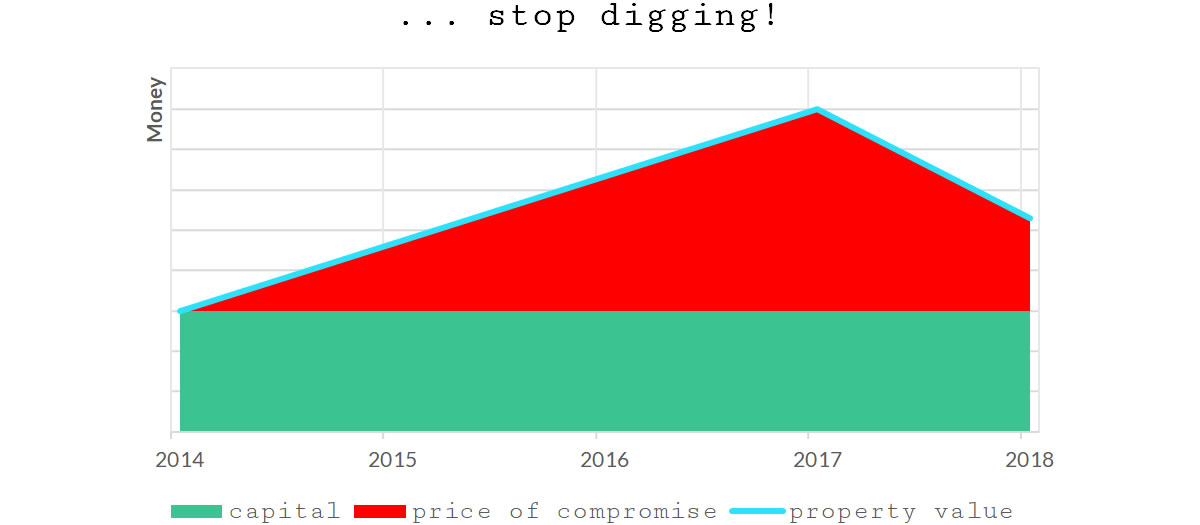“The world is like the game Monopoly. The way to win is to buy as many properties as you can, as early as you can. Borrow as much money as the banks will lend you, on interest-only terms. When you are young, and have nothing to lose, you can afford to go big and be fearless!”
This was the advice of my first landlord in London, moments after I signed a 12-month lease for a tiny studio flat with all bills included.
He didn’t just own this flat. He owned half the street.
The landlord was an absolute charlatan!
His property empire was built on self-certified “liar’s loans”, bravado, guile, and deceit.
The mortgages were all of the 100% Loan-To-Valuation interest-only variety, back in the days when lenders were throwing money at borrowers to secure their business.
It also turned out he seldom paid his bills on time, as demonstrated by the steady stream of red letters and threats to send in bailiffs that were addressed to him but delivered to my flat.
To give credit where it is due, he masterfully juggled vast numbers of interest-free balance transfer credit cards, somehow managing to keep one step ahead of an ever-present bankruptcy threat.
At the time, the property market was booming. The landlord revalued his properties every six months, extract all the accumulated equity generated by surging property values, and using it to expand his empire.
It was a house of cards.
Like a politician with their snout in the trough, the landlord was determined to line his pockets until the gig was up.
His end game was outright ownership of several income-producing properties in his home country.
Once he had completed his acquisition phase, he planned to sell the majority of his London properties.
The accumulated equity remaining after paying off their loans was destined to clear down the debts over the few properties he retained.
As a hedge against the property boom busting, any surplus cash each month was transferred overseas, out of reach of local creditors and courts.
Should the market collapse or interest rates markedly rise, he intended to be on board the first flight home. A country with whom the United Kingdom did not have an extradition treaty.
Sometimes the bad guys win
Last I heard the landlord had taken a bit of a stumble.
Eventually one of his unpaid creditors lost patience and had a County Court Judgement issued against him. Shortly afterwards that cost him his job at a “too big to fail” bank, where they frowned upon bank officers having a poor credit history.
Out of curiosity today I queried the Land Registry sales history. My former landlord appears to have:
- Avoided bankruptcy
- Sold the majority of his properties 4-5 years after I rented mine from him
- Retained ownership of a few properties on that street, though not my old flat.
All’s well that ends well?
It would be possible to draw a bunch of different conclusions from this:
- Applauding the landlord’s ability to perform financial acrobatics
- Being slightly disappointed to discover, yet again, that in real life the bad guys often win
- Feeling disheartened that he failed to receive the comeuppance that he so richly deserved
- Recognising the similarities with Donald Trump’s approach: rules only restrict those who follow them
The landlord was clever. Apart from some tardy bill paying, he didn’t actually break any laws.
Yet personally I was appalled at his ethics and cavalier approach to taking other people’s money with little regard to whether it would be repaid.
However I recognise that my values and risk tolerance held me back, while his allowed him to gamble and win.
Compromised
To varying degrees we all experience compromise every day.
Sometimes it is us compromising ourselves to accommodate others.
- Holding the line.
- Keeping the peace.
- Taking one for the team.
- Trying to make someone else happy.
Conversely others compromise themselves to accommodate us.
- Our friends.
- Our colleagues.
- Those we live with.
Each of those compromises has a price, albeit often not an immediate financial one.
Compromise a little
There are those little compromises that individually are trivial, but collectively over time can become a crushing weight.
Loading the office dishwasher, when selfish co-workers who use all coffee mugs never do.
Replenishing the kitchen, when greedy flatmates happily consume whatever food is there but never replace it.
Picking up after a lazy spouse, who constantly leaves wet towels on the bathroom floor, deposits dirty clothes on every flat surface, and hasn’t switched a single light off in living memory.
These are ticking time bombs… not a problem until they are. However once they become one, there is no putting that genie back in the bottle!
Compromise a lot
Then there are the larger cost compromises.
Indulging the never satisfied whims of a spendy spouse.
Holidaying at Lake Como and Courchevel because that is what the Joneses do.
Falling for the tourism industry propaganda that spending on experiences is somehow nobler than spending on stuff.
Occupying a home with the extra room necessary to accommodate a vast collection of power tools or designer shoes.
These types of compromise involve trading future prosperity for “live in the moment” indulgence. We all do this to varying degrees, but everyone draws a different line on how much is too much.
High price of compromise
Finally there are the huge life-altering compromises.
Remaining with a spouse who is suffering an addiction or long term illness.
Having more (or fewer) children that you would like, out of respect for your partner’s preferences.
Living in a city (or country) to be closer to one spouse’s friends/family, at the expense of the other’s.
Compromises of this type have a high cost indeed.
The nursing staff at the chemo ward my father attended anecdotally estimated that roughly a third of their patient’s marriages didn’t survive a terminal cancer diagnosis. The prospect of investing a material portion of their own scarce time remaining to care for someone who is terminally ill proves too great a compromise for some healthy spouses.
They choose to cut and run instead.
This must be a heartbreaking decision for those who face it.
Love, loyalty, duty, respect, and honouring a shared past crash into the sudden realisation that you only get one chance at life.
Imagine facing that choice, particularly if you are closer to the end than the beginning of your own life.
The joy of marriage
One of the lesser discussed joys of marriage is being constantly reminded of your past mistakes and shortcomings.
It prevents us getting a big head.
It keeps us grounded.
At times it really sucks!
My lady wife heard the landlord’s advice and took it to heart.
Not with the intention of becoming a property mogul, but rather by subscribing to the conventional wisdom that those who are not “on the property ladder” are missing out on all the wealth being generated by those who were.
As the end of our tenancy approached, a flat was listed for sale on the street we lived on.
The asking price: £84,500.
This for a centrally located flat in London’s Zone 1, a five-minute walk from Kensington Gardens and Hyde Park.
My lady wife wanted to buy it.
I refused. I hadn’t expected to remain in London as long as we had already. I definitely didn’t plan on settling there.
It is funny how life works out!
Six months ago a similarly sized flat on the same street sold for £550,000, an inflation-adjusted capital gain of more than £400,000.

If at first you don’t succeed…
Years later my lady wife fell in love with her “forever” house, which had an asking price roughly the size of Britain’s foreign debt.
Once again I refused.
I pointed to the growing signs of a market slowdown.
The absence of suitable schools within viable commuting distance.
The planned demolition of the local hospital, which would mean leaving near a major construction site for the next several years while apartment buildings were constructed.
We ended up renting a similar house on the same road.
Inevitably the property prices on the street rose another £250,000 before the market peaked.
Ofsted awarded the local school an Outstanding rating at its next inspection.
The hospital closure was postponed for another election cycle, due largely to an oversupply of new build flats in London.
I wasn’t wrong about just one of those factors, I was wrong about all of them! Consistency is important though, I’m sure you will agree.

My lady wife could quite reasonably claim that her price of compromise for being married to me runs into the high six figures! I couldn’t possibly comment on whether she has ever given voice to that particular observation.
How much is too much?
For most of us there comes a point where any further compromise is a compromise too far.
We seek to change jobs when the office politics get too much.
The pointy-headed boss becomes unbearable.
We tick all the performance objective boxes, yet still get screwed at bonus time.
We are passed over for promotion in favour of someone with less talent but better connections.
The undercooked “hot desk” seating capacity regularly finds us squatting at meeting tables or camped out in the kitchen due to a lack available of desks.
Eventually we decide that enough is enough. We are done compromising!
Bitching and whinging to our friends and loved ones about our circumstance hasn’t helped. Nothing has changed, except they have tired of hearing it.
Things will only change if we take action to help ourselves.
We change cars when the running costs and repairs become too great. The compromises required to retain the old vehicle eventually outweigh the price of replacing it.
Once again, the compromising only stops once we take action to help ourselves.
Marriage compromised?
From a logical perspective, this line of reasoning should also apply to relationships.
Ask yourself: what have you given up or compromised yourself over, in order to make things work with your current significant other?
Next ask yourself: how much do they compromise themselves to remain with you? What things do they do for you, that you take for granted or no longer notice?
And now for the big question: at what point does the cost of compromise become too much?
When does compromising become being compromised?
Every relationship contains a million little things that go unnoticed, until they are no longer there.
- Who washed the sheets and made the bed(s)?
- Who took the rubbish out?
- Who bought the groceries?
- Who helped the kids with their homework?
- Who took the pet to the vet?
- Who made sure the bills got paid?
The vast majority of those things are non-financial… though the ever-increasing “cost” of my lady wife’s twice thwarted home ownership dreams certainly hasn’t escaped notice!
Ironically ending a long term relationship can be one of the highest financial costs a person can incur. More than a few Financial Independence plans have been put to the sword by a divorce.
That is a high price to pay for leaving the toilet seat up or failing to take the rubbish out one time too many!
References
- CPI Inflation Calculator (2019), ‘UK Inflation Calculator‘
- HM Land Registry (2019), ‘Price Paid Data‘
- Young FI Guy (2019), ‘The Economics Of Divorce‘
- Zoopla (2019), ‘House Price Estimates‘

Phil Money Mongoose 12 July 2019
My wife wants to buy a hugely over-priced house. I don’t. This article makes me worried! ?
{in·deed·a·bly} 12 July 2019 — Post author
You’re in a tough spot Phil.
My experience suggest the “happy wife, happy life” cliché is only sometimes true, but I can reliably report the inverse is invariably true!
Good luck!